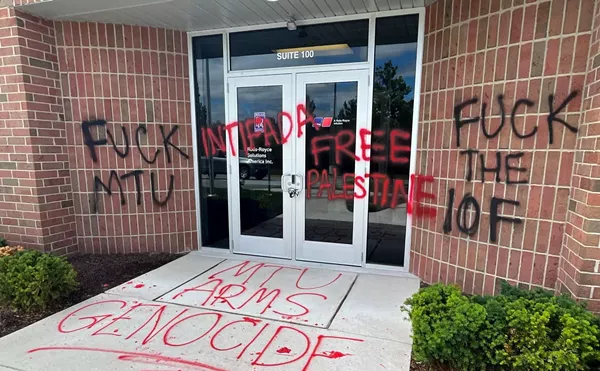
Audio By Carbonatix
[
{
"name": "GPT - Leaderboard - Inline - Content",
"component": "35519556",
"insertPoint": "5th",
"startingPoint": "3",
"requiredCountToDisplay": "3",
"maxInsertions": 100,
"adList": [
{
"adPreset": "LeaderboardInline"
}
]
}
]
In 1994, Mike Diana, creator of the all-but-unknown illustrated ’zine Boiled Angel, sat in a Florida courtroom and listened as a judge destroyed his life and career. Diana had become the first American artist to be convicted of obscenity for his or her artwork.
A Florida undercover detective, posing as a contributing artist, had enticed Diana into sending him two copies of Boiled Angel. The self-published ’zine had achieved some notoriety for Diana’s shocking, graphic depictions of serious societal problems: Child abuse, date rape and the inhumanity and intolerance brought about by the abuse of religion. Boiled Angel wasn’t pretty, but it was protected under the Constitution. Or was it?
A Florida jury found Diana guilty of producing obscenity because they agreed his work "lacked serious literary, artistic, political or scientific value" when compared to such works as The Grapes of Wrath or Picasso’s Guernica.
Diana appealed his conviction to the United States Supreme Court. In June 1998, the highest court in the land upheld the decision by the Florida judge. Diana had to pay a $3,000 fine, undergo psychological testing, have no contact with children under 18, perform 1,248 hours of community service, enroll in a journalistic ethics course and serve three years of probation, during which he is prohibited from being in possession of, or creating, "obscene material."
In other words, if Diana is caught so much as sketching on a cocktail napkin, he could be thrown in jail.
This is not the first incident of censorship in the comic book industry, but it’s certainly the most dramatic. Diana is now living in New York City and, for a time, was serving out his community service by volunteering for the very organization that paid his extensive court costs – The Comic Book Legal Defense Fund.
Since 1990, CBLDF has raised more than $200,000 to pay expenses related to defending free speech and freedom of expression in the artistic community. The Fund has helped more than a dozen comic book retailers and professionals fight the censors – some successfully, some not.
"It’s funny," says Denis Kitchen, president and founder of both CBLDF and Kitchen Sink Press, "because in the first 15 or 20 years of my existence in underground comics, there were very, very few cases (of censorship). I think it’s mostly because (comic books) were literally pretty underground and they weren’t that visible. As comics began to get more popular, people – including local authorities – began to be more aware of them. And the elements of the population that were ... let’s just say religious, morally uptight, began to freak out because in their eyes comic books were for kids. Suddenly they saw comic books with sex, drugs, politics, you name it, that were not the comics they grew up with."
Today, nearly 80 percent of comic books are read by adults – a statistic that doesn’t seem to faze the censors.
The nonprofit CBLDF started in 1990 after another infamous obscenity trial, of Friendly Frank’s, a comic book store in Lansing, Ill., which had been busted four years previously for selling "obscene" comics.
Kitchen, whose Kitchen Sink Press had produced one of the books seized in the raid (Omaha the Cat Dancer), began drumming up support for his embattled client. "We ended up raising between $20,000 and $30,000," he remembers. "I then went out and found the best First Amendment attorney in the country … a guy named Burton Joseph, who was associated with the Playboy Foundation."
Joseph successfully overturned the conviction at the appellate level. Inspired by the triumph, Kitchen started the CBLDF in case this sort of thing were to happen again. It did.
The CBLDF’s guiding principle is that "comics should be accorded the same constitutional rights as literature, film or any other form of expression." Quite often, they are not.
In 1996, the CBLDF helped win a long-fought battle in California. Comic book writer and artist Paul Mavrides (The Fabulous Furry Freak Brothers) was disputing a 1990 sales tax bill in the amount of $1,400 based on the sales of his artwork. Under California law, unlike novels or movie scripts, comic books did not qualify as "intangible ideas presented in manuscript form" and their creators were subject to the same taxes as producers of raw goods such as corn, pencils and matchbook covers.
In the wake of a five-year crusade (and more than $75,000 in legal fees), California’s Board of Equalization agreed that comics are an expression of ideas and thus should be considered as part of an author’s manuscript.
Put simply, the Fund is interested in any case in which an artist’s constitutional rights have been trampled. In recent years, it has gained some powerful allies. Well-known artists and writers such as Frank Miller (Sin City), Dave Sim (Cerebus) and Neil Gaiman (Sandman) regularly contribute to CBLDF’s fundraising efforts by donating artwork, comics and autographs for auction at comic book conventions or through the Fund’s Web site. Numerous publishers (Frontier Comics, Head Press) have donated profits, and recently, Oni Press in Portland released Free Speeches, a graphic novel designed to raise funds and consciousness in the continued fight against comic book censorship.
The book includes orations by Dave Sim, Frank Miller and Neil Gaiman alongside the powerful words of Nadine Strassen, president of the American Civil Liberties Union. Illustrations for the book were donated by such graphic luminaries as Arthur Adams, Peter Bagge, Jaime Hernandez, Sergio Aragones, Shannon Wheeler, Evan Dorkin, Bill Sienkiewicz, Will Eisner and many more. Printing companies, comic book distributors and others waived their normal fees to help this important book reach the public.
Obviously, censorship is of concern to the entire comic book industry. The industry’s concern is hardly surprising, since comic books are under their biggest censorship barrage since the 1950s.
Following soon after Mike Diana’s disappointing case was the end to a similar battle in Oklahoma. Planet Comics of Oklahoma City was the target of a police raid in September 1995, when police were tipped off by a nonprofit obscenity watchdog group called Oklahomans for Children and Families (you may remember them as the group which forced police to raid local homes and snatch back rental copies of the "obscene" film The Tin Drum – a 1979 Academy Award winner).
Planet Comics’ owners, Michael Kennedy and John Hunter, were arrested, carted away in handcuffs and charged with trafficking, keeping for sale and display obscene material deemed to be harmful to adults. The disputed work was a nationally distributed, "adults only" comic, Verotika #4.
The Fund paid the men’s nonrefundable $50,000 bond. In September 1997, however, the two pleaded guilty to reduced charges to avoid going to trial. In exchange, they were granted a three-year deferred prison sentence and a fine of $1,500 each.
Word now seems to be getting out about the Comic Book Legal Defense Fund. Kitchen is confident that "the signal we sent out there to both our industry and to every district attorney who was paying attention was, ‘Look, here’s an organization that’s willing and able to fight. You pick on us and we’re not gonna fall over. That’s important, because I tell you, early on these cops and these prosecutors tended to be bullies. They didn’t expect a comic shop to fight back."
In the future, perhaps election-minded politicians, conservative judges and uninformed community leaders will think twice about trying to knock down an easy target like today’s "funny book" peddlers.
"It’s unfortunate that we need to continue to exist," concedes Christopher Oarr, executive director of the CBLDF. "But what we find is that we can be much more effective operating quickly, responding quickly and being as proactive as possible in educating people both about the First Amendment and about the reality of the comic book marketplace."
Devin D. O’Leary first wrote this piece for the Weekly Alibi, in Albuquerque, N.M. E-mail comments to letters@metrotimes.com




